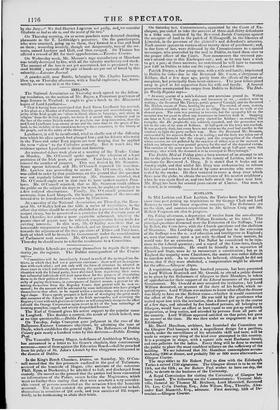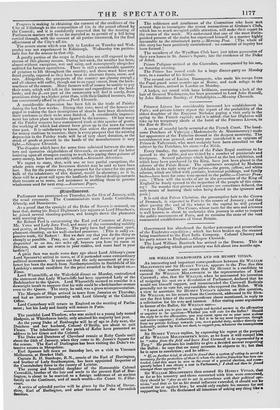SCOTLAND.
In Mid Lothian and East Lothian, the Tories have been busy for sonic time past getting up requisitions to Sir George Clerk and Lord Itionsay to stand for those respective counties. The Reformers are on the alert, and counter-requisitions to Mr. Gibson Craig and Mr. Robert Ferguson are also in progress.
On Friday afternoon, a deputation of twelve from the non-electors of Glasgow waited upon Lord William Bentinck, at his hotel. The principal questions discussed were the Extension of the Suffrage, Vote by Ballot, the Corn-laws, with the Church questions arid the abolition of Sinecures. His Lordship said, the principal bar to the extension of the Suffrage was the sr. .e of education and intelligence in England; as, were that country upon a par with Scotland in these matters, he would vote for an extension. The Ballot he considered to be inju- rious to the-Liberal question ; and a repeal of the Corn-laws, though desirable, impracticable. He would be friendly to a separation of
Church and State, were he to reconstruct a constitution ; but as in England the majority were Churchmen, the matter was rather difficult to interfere with. As to sinecures, he believed, although be did not know, that if they were abolished, a compensation might be allowed for the office.—Glasgow Argus.
A requisition, signed by three hundred persons, has been presented to Lord William Bentinek and Mr. Oswald, to attend a public dinner to be given by the Reformers of Glasgow to their Members, in token of approbation for their support of the Liberal measures of the present Government. Mr. Oswald at once accepted the invitation ; but Lord William demurred, on account of the state of his health, which re-
quired repose. Lord William was anxious to know what effect the dinner was likely to have on the Reform cause—whether it would counteract the effect of the Peel dinner? He was told by the gentlemen who waited upon him with the invitation, that a dinner got up in the course of a few days, and attended by five hundred persons, all belonging to Glasgow, would have an effect at least equal to one got up with much preparation, at long notice, and attended by persons from all parts of the country. Lord William appeared satisfied on that point, but gave no answer at the time. He was then under an engagement to go to Edinburgh.
Mr. David Hamilton, architect, has furnished the Committee on
the Glasgow Peel banquet with a magnificent design for a pavilion, which, under the surveillance of his admirable skill and taste, will be made to surpass any thing of the kind ever attempted in this country. It is a pentagon in shape, with a square side next Buchanan Street, and two galleries for the ladies. Every thing will be done to warrant the public to place the most confident reliance on the sufficiency of the building. We are informed that Mr. Hamilton contemplates accom- modating 2-200 at dinner, and probably 700 or 800 more afterwards.—. Glasgow Courier. The requ'sitioe to Sir Robert Peel to dine with the Edinburgh Tories r. ceived 1750 signatures. The Glasgow dinner is to be on the 13th, not the 12th; as Sir Robert Peel wishes to have one day, the 12th, to devote to the business of the University.
A Royal Commission for visiting the University of Glasgow has
been issued. The following are time Commissioners: Viscount Mel- ville, General Sir Thomas M. Brisbane, Lord Moncrieff, Reverend Dr. Lee, Colin Dunlop, Esq., John Wilson, Esq., Thornlie, Alex- ander Earl Monteith, Esq., advocate. First meeting, 12th of De- cember.— Glasgow Courier.
Progress is making in obtaining the consent of the creditors of the C;ity of Edinburgh to the composition of 15s. in the pound offered by the Council ; and it is confidently expected that by the meeting of Parliament matters will be so far matured as to permit of a bill being carried through, with the consent of all parties interested, for the final adjustment of the City's affirs.
The severe storm which was felt in London on Tuesday and Wed- nesday was not experienced in Edinburgh. Wednesday was particu. larly fine for the season in that city.
A goodly portion of the crops in Perthshire are still exposed to the storms of this gloomy season. During last week, the weather has been, almost without exception, wet and rainy, and consequently altogether unfitted for harvest operations. There is still a considerable quantity of potatoes to lift throughout the country; and these must have suf- fered greatly, exposed as they have been to alternate frosts, snow, and rain. Altogether, the prospects of the country are gloomy enough ;
and all classes will suffer, though not to an equal extent, from the back- wardness of the season. Many farmers will of course be unable to pay their rents, which will tell on the income and expenditure of the land-
lords ; and the iJL,rer part of the community will feel it sorely, from provisions rising to a higher price than, with theirlimited incomes, they can conveniently afford to give.—Perth Chronicle.
A considerable depression has been felt in the trade of Paisley during the last four weeks. During that time, most of the houses en- gaged in making the finer descriptions of shawls have been dismissing
their workmen us their webs were finished. A considerable improve- ment has taken place in muslins figured by the harness. Of late many
of the Paisley weavers have commenced work at this species of goods, the working of which had almost been given up in the town for some time past. It is satisfactory to know, that unless the present demand
for money continue to increase, there is every prospect that the existing depression in the Paisley trade will be of very short duration, as the stock of goods at present in the hands of the manufacturers is very light.— Glasgow Chronicle.
The disputes which have for some time subsisted between the mas- ters and operative shipbuilders of Greenock, on account of the latter insisting upon all strangers coming to work here paying three guineas of entry-money, have been amicably settled.—Greenock Advertiser.
We regret to state, that, with one or two partial exceptions, the whole grain crops of the Inverness district may be said to have been lost. But for the potato crop, the prospect for the winter for the great bulk of the inhabitants of this district, would be alarming ; as it is, there will be a great call upon the landlords for liberal dealings towards their tenants as to rents, and assistance in enabling them to procure wholesome seed for next crop.—Inverness Paper.



























 Previous page
Previous page